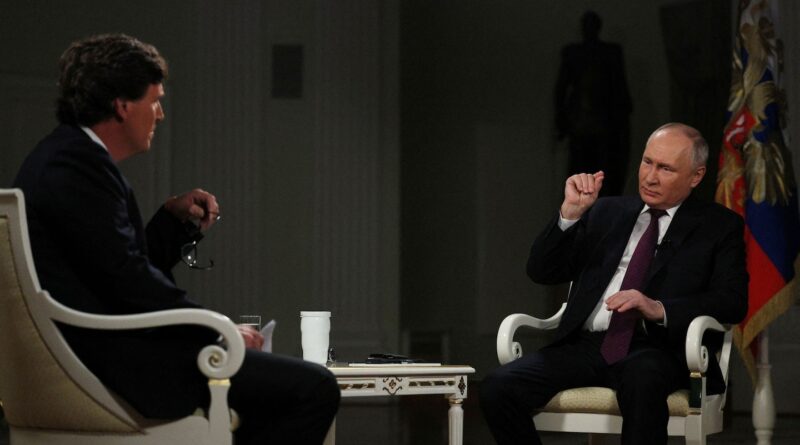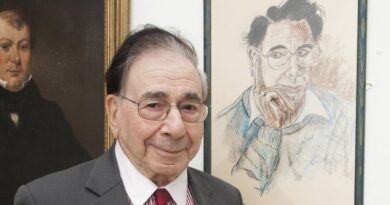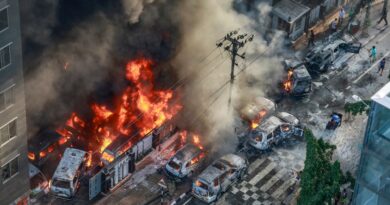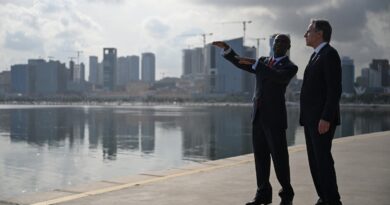Tucker Carlson exposed Putin’s true war motive: For Russia to own Ukraine
“What you are about to see seemed to us sincere,” Carlson told his internet viewers before the interview was broadcast on Thursday evening: “A sincere expression of what he thinks.”
For Carlson, and the American audience that the Kremlin was aiming to reach by agreeing to the interview, that may have been a surprise. But for Ukrainians, who have been living for more than two decades with Putin denying Ukraine’s right to exist as a country separate from Russia, the interview sparked only fury.
For them, perhaps the one shock was that conservative American voters might fall for Putin’s litany of lies, half-truths and distortions, including a claim that he wants to negotiate with Washington to end the war, which would mean forcing Ukraine to surrender its territory. Ukrainians accused Carlson of being a Kremlin pawn, giving a platform to a warmongering dictator with strategic designs on influencing this year’s U.S. presidential election.
“The only thing that genuinely triggers certain reactions is that Putin, a war criminal with an arrest warrant from The Hague Tribunal, is being interviewed instead of being interrogated as he should by an investigator ” said Oleksiy Danilov, secretary of Ukraine’s National Security and Defense Council. “That is the only thing he should be doing in the remaining days of his life, no matter how many he has left.”
Ukrainians, however were not the Kremlin’s intended audience. Putin’s message, including a 30-minute falsehood studded history lecture, was aimed at Carlson’s demographic: Republican supporters of former president Donald Trump, many of whom have expressed admiration for the Russian leader and questioned U.S. support of Ukraine.
Putin seemed eager to convince them that Ukraine rightly belongs to Russia, and that President Biden and Ukrainian President Volodymyr Zelensky are the ones prolonging the war. Whether he succeeded remains to be seen. But what is already clear is that Putin dominated the interview from start to finish.
Carlson made no mention of the war crimes allegations against Putin, and at times the host seemed out of his depth, struggling to keep up with Putin’s history lecture, with its list of dates and unfamiliar names, such as the Varangian Prince Rurik of Scandinavia — stretching back to the 10th century.
Putin, a trained KGB agent, easily sidestepped Carlson’s infrequent attempts to elicit a direct answer.
“Are we going to have a serious talk or a show?” Putin snapped at one point, after Carlson tried to prod Putin to say that he invaded Ukraine because he felt NATO might launch a surprise attack. (Carlson noted that these were Putin’s actual words to justify his invasion in 2022 — one of the few times he tried to hold the Russian leader’s feet to the fire.)
Putin also proved himself better prepared than Carlson, bringing up, to the ex-Fox News presenter’s apparent surprise, the fact that Carlson majored in history in university and had attempted — and failed — to join the CIA.
“We should thank God they didn’t let you in, although it is a serious organization, I understand,” Putin said, in what appeared to be a dig at Carlson. Putin’s remarks were translated into English and a transcript was published on Carlson’s website.
Subtle taunts aside, however, Putin used each question to hammer home his main arguments: that Russia was the aggrieved party, a victim of repeated false promises by the West. Despite this, Putin insisted, Moscow was ready to negotiate an to end the war — but with the United States, underscoring his insistence that the Ukrainian government is an illegitimate puppet of the West. President Biden has repeatedly said Ukraine must decide when, or if, to make peace.
“Don’t you have anything better to do?” Putin asked in response to a question about the possibility of U.S. troops being sent to Ukraine — a prospect that, contrary to Carlson’s query, has never been on the table in Washington.
“Wouldn’t it be better to negotiate with Russia — make an agreement,” Putin said, adding: “Russia will fight for its interests to the end.”
“We are ready for this dialogue,” Putin told Carlson.
The supposed willingness to negotiate, however, contrasts sharply with Russia’s long insistence that only Ukraine’s total capitulation, including a broad surrender of occupied territory, will end the war.
But it was also just one of Putin’s many misrepresentations during the interview. He also suggested, for example, that Russia troops pulled back from trying to conquer Kyiv as part of a peace deal, which was later violated by Ukraine. In fact, Russia’s forces were defeated and retreated after suffering heavy losses.
Still, some of Putin’s supporters said they believed his message would be heard in America, helping Trump to win in November and encouraging congressional Republicans to continue blocking any new aid to Ukraine.
“The result of Putin’s interview with Carlson could be that a few million Americans will say, ‘yeah, so Putin is for peace. And Trump is for peace. Only Biden and Zelensky are for war,’” pro-Kremlin political analyst Sergei Markov said. “So we should vote for Trump and against Biden and then there will be peace and no threat of nuclear war.”
Markov added that as a result of the interview, “Trump will convincingly win the election and become president of the United States, Trump and Putin will quickly agree on peace in Ukraine, and the war will be over.”
Putin also told Carlson that a main reason for the invasion, and one of Moscow’s continuing chief goals, is the “denazification” of Ukraine — part of Putin’s continuing false allegation that Kyiv is controlled by Nazis. Ukraine is a democracy, and Zelensky, who was overwhelmingly elected president in 2014, is of Jewish descent, as are other top officials. Putin’s real goal, many analysts say, is to oust Zelensky in favor of a Russian puppet regime.
The rest of the interview contained an array of Kremlin falsehoods or half-truths including Putin’s insistence that “NATO and U.S. military bases started to appear on the territory, Ukraine creating threats to us.” In fact, NATO before the invasion had rebuffed Ukraine’s efforts to join the alliance largely out of concern about antagonizing Russia.
“Mixing truth with complete falsehoods has been the Kremlin’s propaganda strategy for decades,” the Russian opposition figure Mikhail Khodorkovsky tweeted. “It’s what made the invasion of Ukraine possible.”
The heart of the interview was Putin’s lengthy lecture covering more than 1,000 years of history, from the creation of Kyivan Rus — a state that provided the foundation for modern Ukraine, Russia and Belarus — to the present.
Although initially promising to speak just 30 seconds on the subject, the answer lasted nearly a half-hour — all to make Putin’s case that Ukrainians are actually Russians living “on the edge” of the Russian empire.
However, Putin’s version of the history of Ukraine — as well as that of Russia, Belarus, Lithuania, Poland, and Hungary — was riddled with inaccuracies, experts said. This included his false assertion that Poland “pushed” Nazi Germany to attack it and start World War II.
“Putin just took a couple of hours to say: ‘I must destroy Ukraine because I have no idea what Russia is,’” Timothy Snyder, a Yale historian who has written extensively on Ukraine and Eastern Europe, posted on X.
The point of his ramblings may not have been accuracy but rather to overwhelm viewers with a tsunami of facts and dates, and impress them with Putin’s seeming erudition with references to Kyivan Rus or the Grand Duchy of Lithuania.
Ukrainians said that Carlson was irresponsible and ineffective as an interviewer.
“The propagandist Carlson” spread “a stream of idiotism, lies and heresy,” former Ukrainian Prime Minister Arseniy Yatsenyuk wrote on Facebook, adding: “Freedom of speech and freedom to lie should not be confused, Comrade Carlson.”
Ebel reported from London and Ilyushina from Riga, Latvia. Robyn Dixon and Natalia Abbakumova in Riga contributed to this report.




